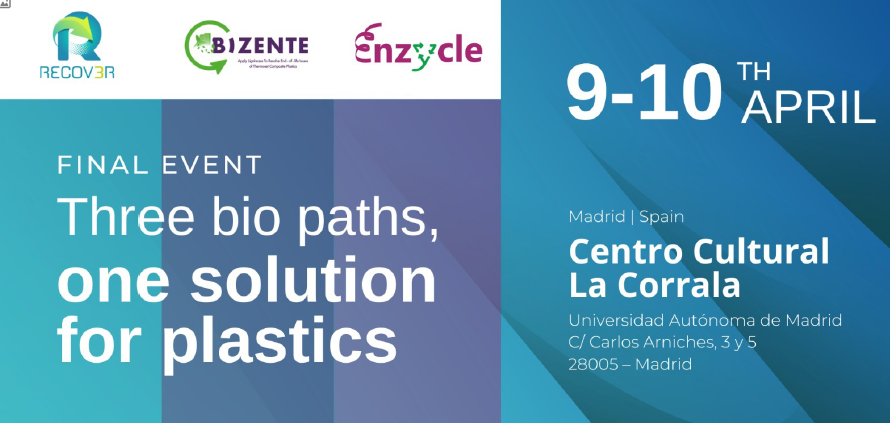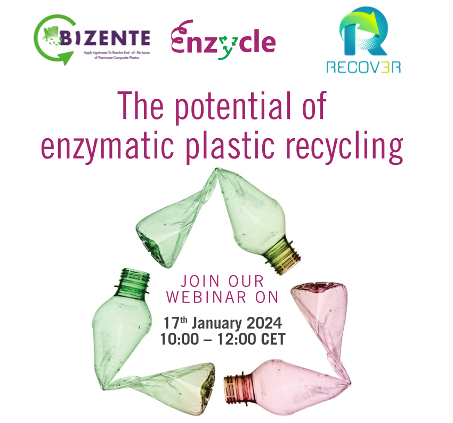EDITORIAL – Insects, earthworms and enzymes combine to close the plastic materials cycle
Since the project started in June 2020, the consortium’s activity has focused on identifying the major plastics present in agri-food plastic waste. These include those corresponding to food packaging, which end up forming part of solid urban waste, as well as those used in agriculture, such as trays, pots or mulch films that are either collected or remain on the ground. In general, the project seeks to develop biotechnological solutions for the degradation of the four most representative plastics of fossil origin: polystyrene (PS), low-density polyethylene (LDPE), linear low-density polyethylene (LLDE) and polyethylene terephthalate (PET). These polymers, both primary (virgin) and secondary (recycled), are used for the development of the project.
For the treatment of plastic waste, candidate organisms/enzymes and the basic conditions necessary to degrade or transform them have been selected. Four microbial combinations (consortia) have shown a promising ability to utilise the full range of plastic polymers as a carbon source, especially for linear low density polyethylene (LLDE) and low density polyethylene (LDPE). Two new enzymes have exhibited high activity and (thermo-) stability against LLDPE and other LLDPE and PS degrading counterparts have been synthesised. Additionally, earthworms Eisenia foetida and Lumbricus terrestres, intended for soil bioremediation and vermicomposting scenarios, have been selected to survive in the presence of plastics exhibiting high enzyme degrading activity. In addition, the insects Tenebrio molitor, Ephestia kuehniella and Galleria mellonella, as well as Acheta domesticus and Hermetia illucens have been tested, but the latter two were not effective in degrading plastics. For each worm and insect, compatible micro-organisms have been identified to enhance their activity.
Furthermore, laboratory-scale production of microbial formulations and combinations of insects/worms with microorganisms is being carried out to determine the best conditions for the degradation/conversion of plastics and the scale-up of their production. These conditions are being applied in field trials, composting reactors and insect cultures to validate the new process at pilot scale, as well as for further validation of the by-products of the process in high value-added applications for different end-uses in food and agriculture.
New microbial consortia and enzymes with activity on a wide range of plastic polymers, as well as earthworms and insects capable of digesting plastics on a complex organic matrix are essential to work towards achieving degradation/conversion of heterogeneous mixed plastics with organic debris and removal of plastics from soil. Further integration of biocatalytic systems (hydrolytic enzymes, microbes, insects and earthworms) is expected to maximise transformation yields, be more flexible, allowing the treatment of mixed plastic waste streams, and enable the conversion of fossil plastics into biodegradable counterparts in a single step.
Developing value-added products
Value-added products to be developed include the valorisation of chitin/chitosan extracted from insects as an additive in active plastics for packaging and mulch films that will provide antimicrobial properties. In addition, biofertilisers such as vermicompost and insect manure will be produced.
Impact
The RECOVER project will have a very positive environmental impact. It is expected to offer huge benefits by decreasing the generation and dispersal of plastics in the changes and reducing the large amount of plastic that is currently buried in landfills or incinerated with the implications this has for GHG release.
Cities will become more sustainable and safer through the reduction of plastic waste. A higher percentage of recycled and biodegraded plastic will result in less plastic reaching the oceans and rivers. In addition, agricultural land will be preserved by preventing pollution. New recycling initiatives will increase plastic recycling in the EU by 12%, creating new jobs. In addition, around 80% of CO2 emissions caused by the common incineration of plastics will be avoided.
Objective
The overall objective of RECOVER is to provide novel biotechnological solutions to the challenges of recycling and contamination of agri-food plastic waste by converting it into bio-products and removing it from the soil.
The RECOVER project will make a valuable contribution by offering solutions to the main problems posed by agri-food plastic waste, as well as establishing a new cross-cutting interconnection in the bioeconomy involving waste management and biotechnology.









There are no comments